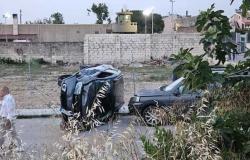Two books “to understand and address today’s anti-Semitism”.
An online initiative by the Turin Jewish cultural association Anavim will bring two recently released texts to the attention of the public. It’s about The ideal enemy (Rai books) by the public service journalist Nathania Zevi and by On the Jews (ed. Bollati Boringhieri) by the director of the Cdec Foundation Gadi Luzzatto Voghera.
The meeting will take place on the Zoom platform and is scheduled for Thursday 27 June at 9.15pm. Professor Asher Colombo, president of the Cattaneo Institute of Bologna and professor of the local University, will discuss with the authors. The meeting will conclude with a reflection by David Sorani.
To participate and have the relevant credentials it is necessary to book by email by writing to: [email protected]
Jews and Israel, false myths and real prejudices
A somewhat provocative and polemical, flowing guide, with several autobiographical hints and at the same time historically documented on Jews, Judaism and Israel. The director of the Cdec Foundation Gadi Luzzatto Voghera goes out to the bookshop with the essay On the Jews: Questions about anti-Semitism, Zionism, Israel and democracy (Bollati Bolinghieri) and aims to dismantle, face to face with the reader, many prejudices and misunderstandings about the Jewish world. He does so as a historian, first clarifying some basic notions and underlining how the representation in public opinion of those who are Jews is very distant from reality «The Jew is known and recognized on the basis of deep and rooted prejudices fueled by anti-Jewish propaganda much more than is known in its actual cultural and religious identity. The imagined Jew is very different from the real Jew”, warns Luzzatto Voghera.
In addition to explaining some key concepts, the historian makes some forays into other areas, from literature to theater to cinema, to explain the connection with Jewish culture. «The Jewish world’s passion for stage representation – theatrical or cinematographic – has solid and recognizable historical origins. We should go back to the Jewish theater companies in Renaissance Italy, but even in subsequent periods there is a certain sensitivity, perhaps favored by the traditional ritual which included moments of convivial joy especially during the festival of Purim (the “Jewish carnival”), often animated by skits and real forms of acting”, writes Luzzatto Voghera.
A broader analysis is dedicated to politics and especially to the meaning of the Zionist aspiration, to its currents, to its being a response to the increasingly virulent anti-Semitism of the second half of the nineteenth century. Zionism wanted to “create a new state form in which the Jews themselves could take refuge and organize their social, economic and cultural life, including religious life, without external conditioning. It was a movement whose characteristics were very similar in origin to those of the Italian Risorgimento”.
The distortion of the historical meaning of Zionism, recalls Luzzatto Voghera, took its first steps in Stalinist Soviet Russia. Here the regime transformed a national self-determination movement into an “imaginative and propagandistic instrument of the financial lobbies at the service of US imperialism” to the detriment of the freedom of the peoples of the Middle East. A rhetoric, Luzzatto Voghera and the research of the CDEC Anti-Semitism Observatory remind us, still very present today, albeit in forms adapted to the current context.
A rhetoric with which the historian enjoys arguing in the second part of the book, constructed as a question and answer to some of the most popular anti-Semitic, conspiracy or simply ignorant statements linked to Jews and Israel. For example, one chapter is titled: «I am not anti-Semitic, I am anti-Zionist! And I couldn’t be anti-Semitic, because the first Semites are precisely the Arabs and the Palestinians.” The author responds to this sentence as if he were in front of a real interlocutor. And he dismantles piece by piece the clichés of those who espouse this thesis, which has resonated in Italian universities.
In addition to refuting the idea that anti-Semitism indicates opposition to Semitic peoples – if this were the case, the false theory of racial division would have to be taken as true – Luzzatto Voghera clarifies that calling oneself anti-Zionist means “opposing the idea that Jews have the right to ‘affirmation of a political state’. The book’s journey continues in the deconstruction of other more or less hateful myths, with many references and connections between culture, Jews and Italy. An effective way to remind the public how Jewish communities are an integral part of national history.
The author seems to have enjoyed constructing this essay: a frank and open dialogue with the reader, useful in times of great misunderstandings.





